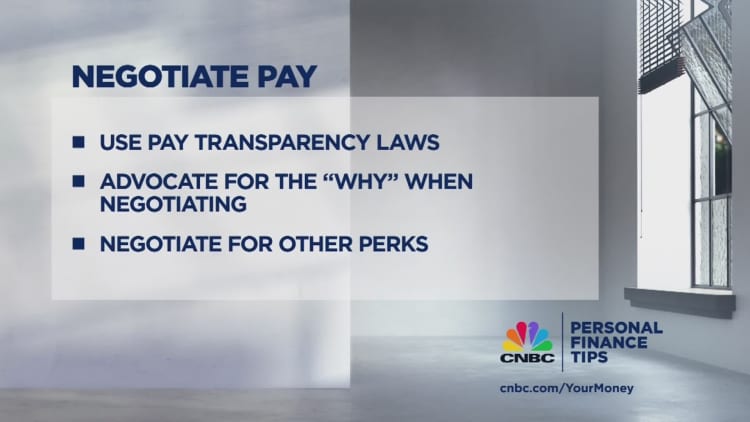Pay transparency laws are intended to increase pay equity for workers of color and women and protect job seekers during the hiring process. Colorado was the first state to require companies to provide salary ranges on job postings, and since then, eight other states have put this law into effect with 16 more and the District of Columbia considering it.
Yet, even with salary ranges out in the open, there is still ambiguity stemming from these laws, especially when it comes to how job seekers should navigate the pay ranges that are now available in job postings.
"In some industries and occupations wide ranges are the norm," said Glassdoor's lead economist Daniel Zhao. "But in others, it is very unusual. And so, in that sense, I think it's important for job seekers to understand the context that they're in."
Now that pay ranges are more accessible than ever before, the task of understanding them is being left to job seekers. However, the scope of these ranges still isn't providing job seekers absolute transparency, as these ranges are leaving job seekers confused about what salary they'll end up receiving.
According to a study from Glassdoor, pay ranges have only modestly widened in states like California and Washington since pay transparency laws went into effect. Glassdoor found that the majority of pay ranges are narrower than plus or minus 20%. Before these laws went into effect, posted pay ranges in California were about plus or minus 9% from their midpoint but have now widened to 11%. Washington also saw pay ranges widen from plus or minus 11% to 12% after these laws went into effect.
"We aren't seeing this explosion in companies posting unnecessarily wide ranges," Zhao said. "You have seen ranges widen very, very slightly since the implementation of these laws. But it hasn't been this dramatic shift by any means."
How to interpret the numbers in new job postings
Although pay ranges are not widening to extreme levels, they can still be confusing for job seekers trying to make sense of potential salaries.
"I think a good rule of thumb for job seekers is if the upper end of the range is 1.5 times the lower end of the range, that's generally considered a reasonable range," Zhao said.
If a job seeker comes across a posting where the bottom end of a range is $40,000, this rule of thumb would show that the top end of the range should be around $60,000. In the case where a pay range surpasses these pay caps, job seekers should do further research on the company and the position to determine whether the numbers they're looking at are reasonable, explained Zhao.
These ranges also tend to vary depending on the industry. When it comes to lower paying jobs, pay ranges are typically narrower and more transparent than that of higher paying jobs. For instance, a cashier at a grocery store would likely have a starting salary set and posted on signs outside storefronts.
"These jobs tend to be more standardized, where the responsibilities don't vary much between two people with the same title," Zhao said.
Working as a vice president in finance, by comparison, is a common title where you're likely to see a lot of variation in work, so these types of companies are likely "to have a fairly wider range in order to capture those different responsibilities that people might have."
Understanding typical salaries in their industry, in their specific job title and in their geographic region are all important things for job seekers to consider, to make sense of pay ranges.
Negotiating the salary you deserve
About half of Glassdoor's job listings include pay ranges, said Zhao. As pay transparency laws continue to expand, it's likely that pay ranges will become the norm. Yet, having the ability to see the pay range offered raises the question of how much job seekers should ask for when interviewing.
"You need to know what your worth is in the market before you start negotiating anything," said Stacie Haller, chief career advisor at Resume Builder.
Your level of education, previous work experience, and technical skills are all factors that determine where you fall in the pay range. While most job seekers want that top end, you need to make sure you meet all the criteria.
"When you ask for way above what you are worth in the marketplace, you're going to eliminate yourself from the running," Haller said.

In some cases, it's possible to negotiate a salary above the high end of the range if you're a job seeker that checks all the boxes.
"There is always room for negotiation, no matter what that pay range is," Haller said. "But I say that with several caveats. One being, you must have all the qualifications for the job, and you must be able to make the case as to why you deserve that salary.
Some employers may be unwilling to budge beyond the posted pay range simply because that's all the funding they're approved for, or because of the equity concerns that would arise from making exceptions for certain applicants and not for others.
"It's important for job seekers to keep in mind that the compensation package is not just about salary, it includes a lot of other things as well, where employers might have a little bit more flexibility," Zhao said.
Bonuses, vacation days and the ability to work remotely are all benefits that can make a lower salary worthwhile, he said, along with the opportunity for salary growth that may not be possible if you start out at the top end of the pay range.
How pay transparency laws are useful
Even with these issues, pay transparency laws are opening doors to greater equity and clarity within the job market for people in many different positions.
"This information is useful for everybody," Zhao said. "Even if you aren't necessarily in the job market, you can still use the information from job postings to understand whether you're being paid fairly based on the market."
And with more states enforcing pay transparency laws, research from Resume Builder found that 85% of people are more likely to apply to a job that lists the salary range, while 63% of workers will demand equivalent pay if it's revealed that co-workers earn more for the same job.
"I think people are learning how to adjust to having this information out there both from the employer side as well as the candidate side," Haller said.
To join the CNBC Workforce Executive Council, apply at cnbccouncils.com/wec.





